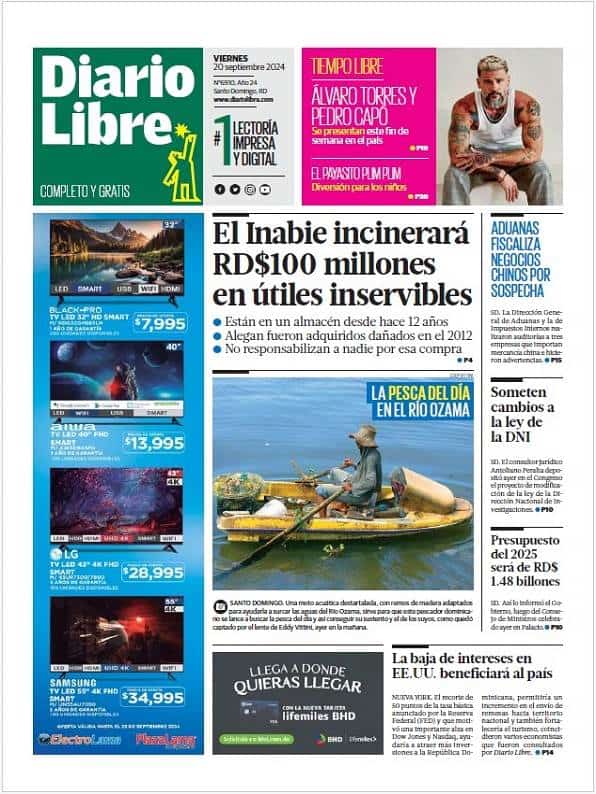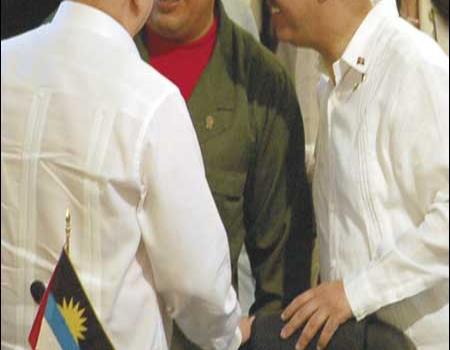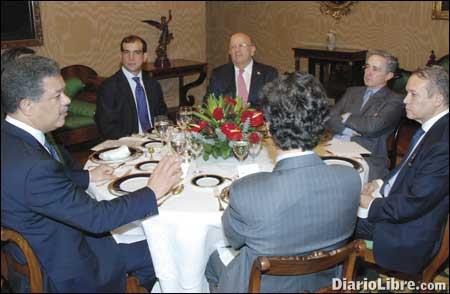Behind the scenes of the failed dialogue with Hugo Chavez
The dialogue between Venezuela and Colombia had reached a stalemate possibly because they did not read the signals that Venezuela was sending out. This is the story of the participation of the Dominican President, Leonel Fernandez, in the process that began in Estoril, Portugal and picked up speed in Cancun, Mexico.
In his recent visit to Cancun to take part in the Rio Group Summit, President Leonel Fernandez approached his counterpart from the Bolivarian Republic of Venezuela, Hugo Chavez Frias, with the idea of following up on the efforts that the Dominican president was making at the request of Colombian President Alvaro Uribe. The request by the Colombian leader came in the framework of a bilateral meeting that both leaders had in Estoril, Portugal during the Ibero-American Summit.
When the Dominican leader, at the Cancun Summit, approached Chavez and refers to the request by Uribe, President Chavez answers in the affirmative and says "let's resolve this problem". All of this was before the luncheon in Cancun in which Uribe and Chavez had a face-off that was mentioned in the press, where he asked Chavez to "be a man" and openly debate their differences.
What happened was that Uribe arrived late to the luncheon and President Fernandez did not have time to tell him that he had received a positive answer from President Chavez to bury the hatchet (or reduce the tension). The Colombian President asked for permission to speak, and during which he expressed his complaints regarding the alleged insults made by the Venezuelan President during one of his "Alo Presidente" radio and television programs.
The heated face-off repeated in the press takes place.
As a result of this, the Rio Group Summit accepted a proposal by President Luz Inacio Lula da Silva of Brazil, for the Dominican Republic, Mexico and Brazil to make up the Group of Friends of Venezuela and Colombia, to which President Felipe Calderon, the Summit host, proposed that Fernandez be the coordinator of the group, because he had a greater ease of communication with both of the chiefs of state.
This was a proposal that was unanimously approved and with the consent of the two leaders in the conflict. Even Carmen Aristegui, in the very Summit meeting, was able to interview Chavez, and the Venezuelan President, trying to discredit Uribe, makes reference to the conciliatory attitude of President Fernandez, which was the result of the conversation that the Dominican President had had with him on this point and trying to find a solution to the Venezuelan-Colombian conflict.
Mediation
On Wednesday, 3 March a visit by Colombian Chancellor Jaime Bermudez was planned, as part of the work by President Fernandez to collect information and the opinions of both parties and later submit a report to the presidents of Brazil and Mexico. Meanwhile, on Thursday, the visit by the Venezuelan Chancellor, Nicolas Maduro was expected.
The Bermudez visit came about and he was received by President Fernandez in his office for about an hour. Last Thursday, nevertheless, Maduro cancelled his trip to the Dominican Republic.
President Fernandez told to President Felipe Calderon of Mexico about his trip to Guatemala to take part in the SICA meeting together with the US Secretary of State Hillary Clinton, and that from there he would go on to Colombia with the idea of meeting with President Uribe and get his government's point of view, pick up information and then go on to receive the Venezuelan Chancellor Nicolas Maduro on Monday 8 March, in the Dominican Republic. In this way, he would have an overall vision of the issues and be able to prepare a report and send it to presidents Lula and Calderon. Calderon himself showed interest in traveling to Colombia to hear the opinion of President Uribe.
The visit to the Dominican Republic by Chancellor Maduro was cancelled "due to scheduling conflicts", according to what was published by the Venezuelan government.
Nevertheless, after the Rio Group Summit, what led Chavez and his government to change from a positive attitude towards an understanding with Colombia and Uribe?
It so happens that on 26 February, the Constitutional Court of Colombia declared null and void the decree regarding the referendum by which the Colombian population were to be consulted regarding a new nomination for the presidency by Alvaro Uribe. From the time that this decision was made known to the public, Venezuela changed from a positive position (which can be verified in the CNN interview) that had been shown to President Fernandez at the Cancun Summit and in front of all of the presidents, to putting off any decision and then saying through Chancellor Maduro this week, that Venezuela would wait to talk with the new government that would come about after the elections later this year in Colombia.
If this was the motive that the Chavez government had to put off the dialogue, why didn't President Chavez talk frankly with his counterpart in the Dominican Republic about his decision not to commit to a dialogue with the Uribe government?
If the Dominican Republic, and very especially President Fernandez, had acted in a friendly and cordial manner with Venezuela and the other countries in the region, why didn't the Venezuelan government do the same, reporting frankly and with transparency on the negotiations that Fernandez started, as the coordinator for the Group of Countries Friends with Venezuela and Colombia?
It is know through the media in Caracas that in reality Venezuela does not want to dialogue, but there was no way to establish communication with the highest officials of that country so that they would know, first hand, the intentions of Fernandez to collect information in Bogota.
Perhaps the error of the Dominican President was in the fact that he gave the impression that he was in a dialogue process when in reality he was in a process of collecting information, a first step towards initiating a dialogue, direct or indirect between both presidents.
What Fernandez did in Colombia was to make contacts to build the agenda for the dialogue, a dialogue that necessarily had to count on Venezuela.
But Fernandez went to Colombia without having made the necessary contacts with the Venezuelan authorities so that they could approve the opportunity of the negotiation. The lack of communication should have been an eloquent signal that something strange was happening. By not getting the signal, the current stalemate has happened.
In his recent visit to Cancun to take part in the Rio Group Summit, President Leonel Fernandez approached his counterpart from the Bolivarian Republic of Venezuela, Hugo Chavez Frias, with the idea of following up on the efforts that the Dominican president was making at the request of Colombian President Alvaro Uribe. The request by the Colombian leader came in the framework of a bilateral meeting that both leaders had in Estoril, Portugal during the Ibero-American Summit.
When the Dominican leader, at the Cancun Summit, approached Chavez and refers to the request by Uribe, President Chavez answers in the affirmative and says "let's resolve this problem". All of this was before the luncheon in Cancun in which Uribe and Chavez had a face-off that was mentioned in the press, where he asked Chavez to "be a man" and openly debate their differences.
What happened was that Uribe arrived late to the luncheon and President Fernandez did not have time to tell him that he had received a positive answer from President Chavez to bury the hatchet (or reduce the tension). The Colombian President asked for permission to speak, and during which he expressed his complaints regarding the alleged insults made by the Venezuelan President during one of his "Alo Presidente" radio and television programs.
The heated face-off repeated in the press takes place.
As a result of this, the Rio Group Summit accepted a proposal by President Luz Inacio Lula da Silva of Brazil, for the Dominican Republic, Mexico and Brazil to make up the Group of Friends of Venezuela and Colombia, to which President Felipe Calderon, the Summit host, proposed that Fernandez be the coordinator of the group, because he had a greater ease of communication with both of the chiefs of state.
This was a proposal that was unanimously approved and with the consent of the two leaders in the conflict. Even Carmen Aristegui, in the very Summit meeting, was able to interview Chavez, and the Venezuelan President, trying to discredit Uribe, makes reference to the conciliatory attitude of President Fernandez, which was the result of the conversation that the Dominican President had had with him on this point and trying to find a solution to the Venezuelan-Colombian conflict.
Mediation
On Wednesday, 3 March a visit by Colombian Chancellor Jaime Bermudez was planned, as part of the work by President Fernandez to collect information and the opinions of both parties and later submit a report to the presidents of Brazil and Mexico. Meanwhile, on Thursday, the visit by the Venezuelan Chancellor, Nicolas Maduro was expected.
The Bermudez visit came about and he was received by President Fernandez in his office for about an hour. Last Thursday, nevertheless, Maduro cancelled his trip to the Dominican Republic.
President Fernandez told to President Felipe Calderon of Mexico about his trip to Guatemala to take part in the SICA meeting together with the US Secretary of State Hillary Clinton, and that from there he would go on to Colombia with the idea of meeting with President Uribe and get his government's point of view, pick up information and then go on to receive the Venezuelan Chancellor Nicolas Maduro on Monday 8 March, in the Dominican Republic. In this way, he would have an overall vision of the issues and be able to prepare a report and send it to presidents Lula and Calderon. Calderon himself showed interest in traveling to Colombia to hear the opinion of President Uribe.
The visit to the Dominican Republic by Chancellor Maduro was cancelled "due to scheduling conflicts", according to what was published by the Venezuelan government.
Nevertheless, after the Rio Group Summit, what led Chavez and his government to change from a positive attitude towards an understanding with Colombia and Uribe?
It so happens that on 26 February, the Constitutional Court of Colombia declared null and void the decree regarding the referendum by which the Colombian population were to be consulted regarding a new nomination for the presidency by Alvaro Uribe. From the time that this decision was made known to the public, Venezuela changed from a positive position (which can be verified in the CNN interview) that had been shown to President Fernandez at the Cancun Summit and in front of all of the presidents, to putting off any decision and then saying through Chancellor Maduro this week, that Venezuela would wait to talk with the new government that would come about after the elections later this year in Colombia.
If this was the motive that the Chavez government had to put off the dialogue, why didn't President Chavez talk frankly with his counterpart in the Dominican Republic about his decision not to commit to a dialogue with the Uribe government?
If the Dominican Republic, and very especially President Fernandez, had acted in a friendly and cordial manner with Venezuela and the other countries in the region, why didn't the Venezuelan government do the same, reporting frankly and with transparency on the negotiations that Fernandez started, as the coordinator for the Group of Countries Friends with Venezuela and Colombia?
It is know through the media in Caracas that in reality Venezuela does not want to dialogue, but there was no way to establish communication with the highest officials of that country so that they would know, first hand, the intentions of Fernandez to collect information in Bogota.
Perhaps the error of the Dominican President was in the fact that he gave the impression that he was in a dialogue process when in reality he was in a process of collecting information, a first step towards initiating a dialogue, direct or indirect between both presidents.
What Fernandez did in Colombia was to make contacts to build the agenda for the dialogue, a dialogue that necessarily had to count on Venezuela.
But Fernandez went to Colombia without having made the necessary contacts with the Venezuelan authorities so that they could approve the opportunity of the negotiation. The lack of communication should have been an eloquent signal that something strange was happening. By not getting the signal, the current stalemate has happened.


 Diario Libre
Diario Libre

 Diario Libre
Diario Libre